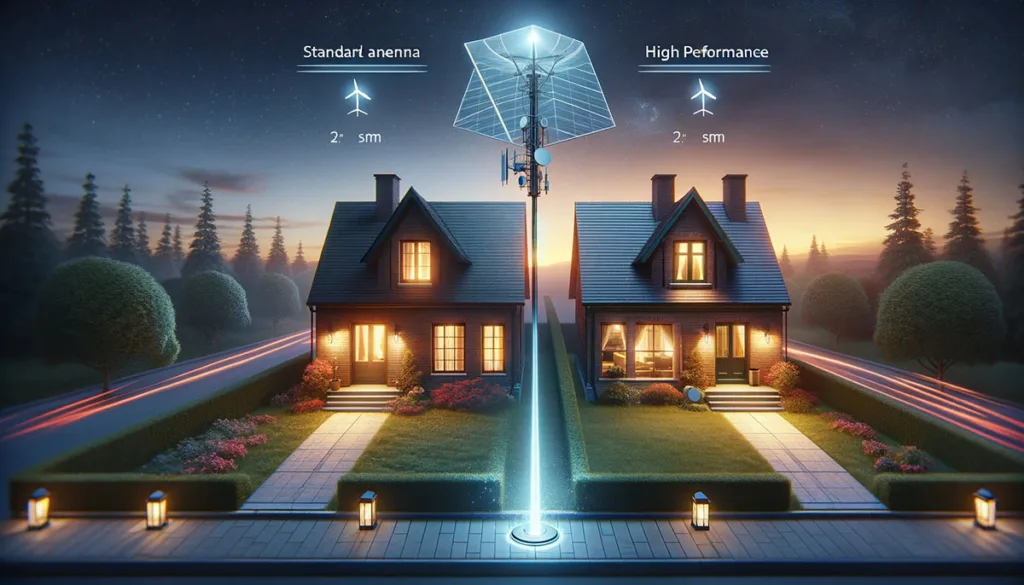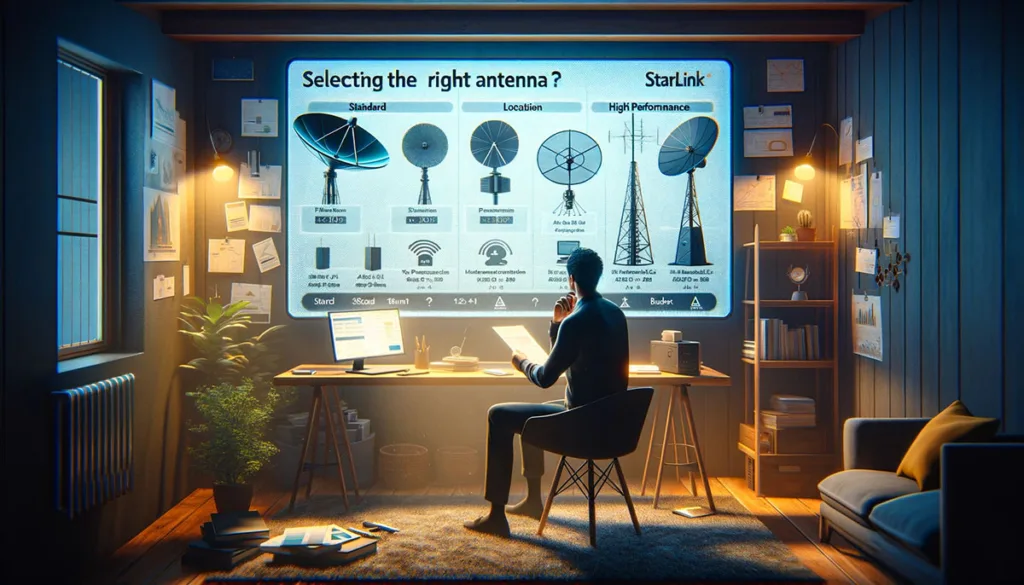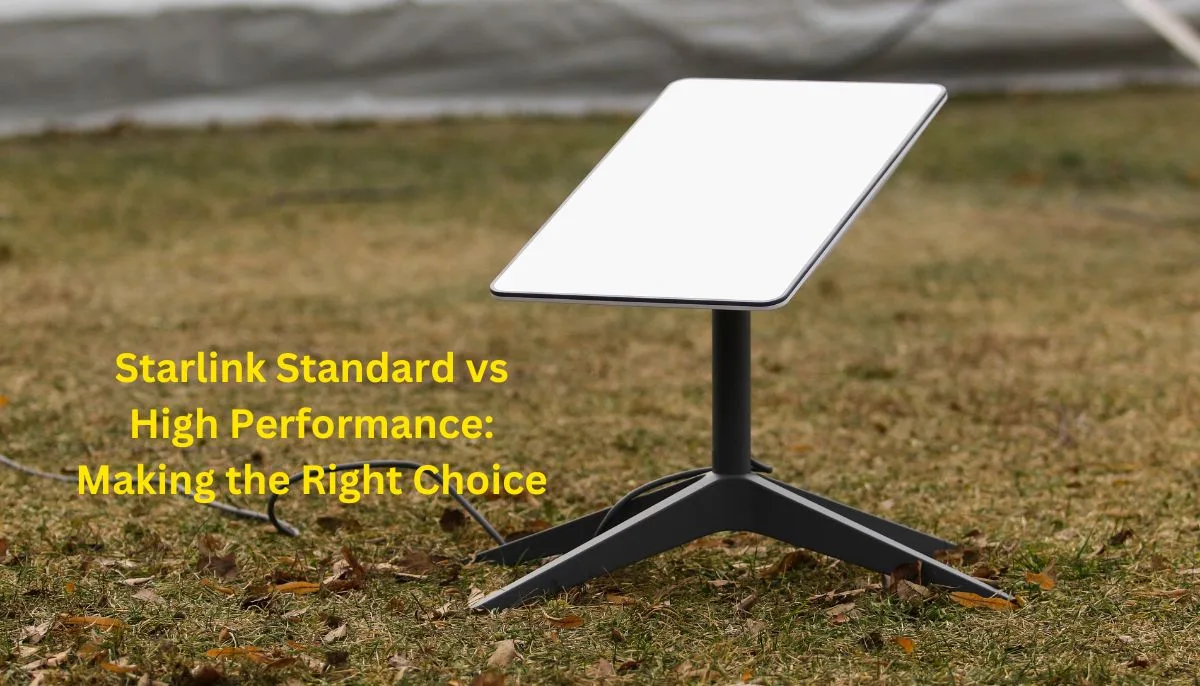Introduction
In today’s era, internet access is crucial to our daily routines, and searching for swift, dependable connections is essential. Starlink, a project by SpaceX, aims to go beyond what is typically available regarding internet service. It pledges high-speed internet service worldwide through its low-earth orbit (LEO) satellite network, reaching even the most isolated areas. This piece examines Starlink’s Standard and High-Performance antennas to clarify which best suits users’ internet service demands, environmental factors, and financial limits. For anyone, from digital nomads to individuals in remote locales desiring a steadier internet link, comprehending the differences between these alternatives marks the initial step towards a more interconnected future.
Section 1: Understanding Starlink’s Offerings

The Mission of Starlink
SpaceX is leading Starlink, a ground-breaking initiative to close the global digital divide. It plans to launch thousands of satellites into orbit, creating a broadband network for high-speed internet everywhere. Recognizing the internet as vital for education, individual travel businesses, healthcare, and more, Starlink uses SpaceX’s technology to make more satellites to provide internet to remote locations where traditional services fall short.
Standard vs. High-Performance Antennas
Starlink presents two hardware options for residential users: the Standard and High-Performance antennas, each addressing different needs that residential users and power users have
- Standard Antenna: Aimed at the general user, this antenna is affordable for dependable internet in areas with minimal obstructions.
- High-Performance Antenna: This version ensures top performance and is built for harsh environments and demanding use cases. Identifying the right choice involves evaluating your location, internet habits, and specific needs for speed and reliability. The following sections will guide you through these antennas’ specifics, helping you decide which Starlink product meets your connectivity requirements.
Unlock the full potential of your Starlink connection with our comprehensive guide. Don’t leave your network security to chance—discover essential tips and strategies in our must-read article, ‘How to Secure Starlink Network: A Step-by-Step Guide‘.
Section 2: Technical Specifications Compared

The Starlink Standard and High-Performance antennas should be considered in detail. Each offers unique benefits tailored to different user needs. By diving into their technical specifications, we can better understand which option might suit your specific circumstances.
Download and Upload Speeds
- Standard Antenna: Its speeds range from 25 to 220 Mbps, which suits most household needs. It supports streaming, video calls, and online gaming; upload speeds are adequate for general use.
- High-Performance Antenna: Offering up to 220 Mbps downloads and 25 Mbps uploads, it caters to those requiring higher upload speeds for content creation or extensive file handling.
Weather Resistance and Operating Conditions
- Standard Antenna: Rated IP54, it withstands light rain and wind and works between -30°C and 50°C, making it suitable for most climates.
- High-Performance Antenna: Its IP56 rating means it can endure tougher conditions, which is ideal for challenging settings. It shares the standard model’s temperature range, ensuring dependable use in diverse climates.
Power Consumption and Environmental Impact
- Standard Antenna: Consuming 50–75 watts, it is a greener, low-power option.
- High-Performance Antenna: Needs 110–150 watts, offering advanced features at the cost of higher energy use.
Installation and Maintenance
Both high-performance dishes and antennas feature easy installation, with the high-performance dish on the standard dish being lighter and potentially more versatile in its dish placement. Despite its size, the high-performance dish antenna is designed for a simple setup to ensure the best connection.
Cost Implications
- Initial Investment: The Standard antenna, priced at $599, presents a more accessible entry point for users. The high-performance antenna’s higher price tag of $2500 reflects its advanced features and capabilities and is aimed at users with specific needs.
- Ongoing Expenses: Beyond the initial purchase, considering the potential impact on energy bills and maintenance costs is essential. The high-performance antenna’s higher power consumption could lead to increased ongoing expenses.
Comparison Table
Take a look at the detailed table of comparison of Starlink standard and high-performance antennas:
| Feature | Standard | High Performance |
| Field of View | 100 degrees | 135-140 degrees |
| Download Speed | 25-220 Mbps | 40-220 Mbps |
| Upload Speed | Up to 10 Mbps | Up to 25 Mbps |
| Weather Resistance | IP54 rated | IP56 rated |
| Operating Temperature | -30°C to 50°C | -30°C to 50°C |
| Power Consumption | 50-75 watts | 110-150 watts |
| Snow Melt Capability | Up to 1.5 in/hour | Up to 3 in/hour |
| Cost of Kit | $599 | $2500 |
| Warranty | 12 months | 24 months |
| Size (L x W) | 20.2 x 11.9 inches | 22.6 x 20.1 inches |
| Weight | 6.4 lbs | 15 lbs |
| Compatibility | Residential & Roam | Business, Land Mobility, Maritime, & Aviation |
Section 3: Installation and Setup

Standard Antenna Setup
The installation process for the Standard Starlink antenna is designed to be user-friendly and straightforward. It includes a kit with all necessary components, such as the Starlink antenna, a mounting tripod, and a power supply. Users can follow the intuitive steps provided in the Starlink app, which guide the placement of the standard Starlink antenna to ensure optimal sky visibility and connectivity. Typically, setup can be completed within 30 minutes, requiring no special tools or professional installation services.
High-Performance Antenna Setup
Similarly, the flat High-Performance Starlinkantenna comes with a comprehensive installation kit. Due to its larger size and increased weight, finding the ideal location may require more effort to ensure stability and optimal satellite visibility. The Starlink app remains a crucial tool, offering guidance on placement to maximize the flat performance of the flat high-performance dishStarlink antenna. Despite its more substantial nature, the installation process for flat, high-performance Starlink dishes is designed to be achievable by the user without needing professional help.
Section 4: Performance in Various Conditions

Urban and Rural Performance
- Standard Antenna: Reliable in urban areas, it also serves well in rural settings, though fixed view limits may reduce effectiveness in obstructed locations.
- High-Performance Antenna: It excels in remote or rural areas, where its broader view and stronger signal ensure steady service where the standard may falter.
Weather and Environmental Impact
Both antennas’ designs account for weather resilience, with the high-performance model offering customers superior protection and functionality in severe conditions. It ensures it stays operational in heavy snowfall, making it ideal for extreme, harsh climates and remote locations.
Section 5: Cost Analysis
Initial Investment and Monthly Fees
- Standard Antenna: The more affordable $599 upfront cost makes the Standard antenna an attractive option for budget-conscious consumers. The monthly service fee, aligned with typical residential internet costs, ensures accessibility without compromising quality.
- High-Performance Antenna: At $2500, the initial cost is significantly higher, reflecting its advanced capabilities and robust construction. While higher than the standard option, the enhanced performance justifies the monthly fees, particularly for business users or those in challenging environments.
Long-term Considerations
When considering the total cost of ownership, it is essential to factor in the potential for higher electricity bills with the high-performance antenna due to its increased power consumption. Additionally, the durability and extended warranty of the High-Performance option may offer better long-term value for those in extreme conditions or residential power users with heavy usage demands.
Step-by-Step Guide for Choosing the Right Antenna for Your Needs

Step 1: Assess Internet Usage
Evaluate your typical internet activities and bandwidth requirements. Households with multiple devices streaming 4K content, gaming, or using high-demand applications might lean towards the high-performance option.
Step 2: Environmental Considerations
Consider the physical environment of your location, including the weather conditions, high temperatures, and potential obstructions. The high-performance antenna is better suited to areas with heavy snowfall, high winds, high temperatures, or significant obstructions.
Step 3: Budget Analysis
Carefully review your budget for both the initial setup cost and ongoing expenses. While the standard antenna offers high-performance dishes at a great price, consider whether the advantages of its superior capabilities in particular situations outweigh its higher costs.
Step 4: Make Your Decision
Balance your internet needs, environmental conditions, and budget to choose the antenna and dish best suits your situation. Remember, each user’s optimal high-performance dish choice depends on these factors.
Conclusion
Selecting between Starlink’s Standard and High-Performance dish antennas involves assessing personal requirements, environmental factors, and financial capacity. By understanding each option’s features, setup, performance, and costs, you can choose a solution that provides reliable, fast internet access suited to your needs. Whether you choose the Standard for everyday use or the top High-Performance dish only for demanding situations, Starlink’s satellite internet service promises to revolutionize your online experience.

